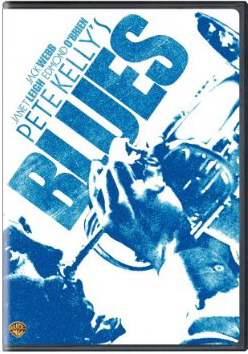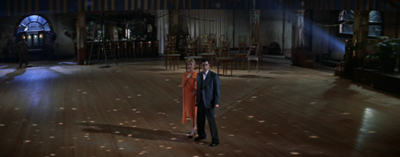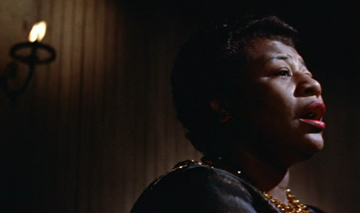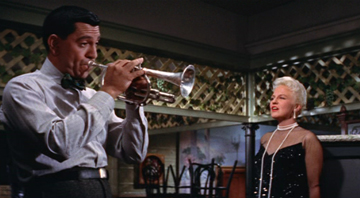| Release List | Reviews | Price Search | Shop | Newsletter | Forum | DVD Giveaways | Blu-Ray/ HD DVD | Advertise |
| Reviews & Columns |
|
Reviews DVD TV on DVD Blu-ray International DVDs Theatrical Reviews by Studio Video Games Features Collector Series DVDs Easter Egg Database Interviews DVD Talk TV DVD Talk Radio Feature Articles Columns Anime Talk DVD Savant HD Talk Horror DVDs Silent DVD
|
DVD Talk Forum |
|
|
| Resources |
|
DVD Price Search Customer Service #'s RCE Info Links |
|
Columns
|
 |
Pete Kelly's Blues |

|
Pete Kelly's Blues Warner DVD 1955 / Color / 2:55 anamorphic widescreen / 95 min. / Street Date July 22, 2008 / 19.97 Starring Jack Webb, Janet Leigh, Edmond O'Brien, Peggy Lee, Ella Fitzgerald, Andy Devine, Lee Marvin, Martin Milner, Jayne Mansfield. Cinematography Harold Rosson Production Design Harper Goff Art Direction Feild Gray Film Editor Robert M. Leeds Original Music Arthur Hamilton Written by Richard L. Breen Produced and Directed by Jack Webb |
This one sneaked onto the DVD shelves before Savant even knew it was coming. Long a guilty pleasure, Pete Kelly's Blues has to be considered good because it's such a pleasure to watch -- and listen to. It's the brainchild of Jack Webb, a character actor who made an enormous impact on radio and TV by starring in Dragnet.
That deadpan cop show, a rubberstamp valentine to the L.A.P.D. (see "Badge of Honor" in L.A. Confidential) validated the commercial prospects of television almost single-handedly. After making a widescreen version of Dragnet Webb turned his attention to his favorite subject, jazz. He'd been married to songbird Julie London and made Pete Kelly's Blues into a combination musical biography, gangster film and performance musical. Helping out in the talent department are star turns from Ella FItzgerald (who sings the great title tune) and Peggy Lee ("Sugar", "He Needs Me").
Unfortunately, Webb's independent producing contract was for acting and directing as well. The handsome Pete Kelly's Blues features solid contributions from a fine cast and every technical department; it should have been the smash of 1955. But Webb is incredibly stiff as the loner bandleader Pete Kelly, killing scene after scene with his perfectly deadly performance. Watching the movie is a schizoid experience -- ignore Webb and it's a great picture in the Warner house style, dressed up in great 20's décor, CinemaScope and stereophonic sound.
First-time viewers of Pete Kelly's Blues are often impressed by its dynamic, directional stereophonic audio. The Warner Sound Department concocted a particular method of recording their orchestra that gave their music tracks more brass and more bite, whether on a big picture or a Bugs Bunny cartoon. 1

The movie is a visual treat as well. It begins with a beautifully realized prologue at a New Orleans jazz funeral that explains where Kelly got his cornet. The carefully designed shots segue into the title sequence with an authority not found in MGM musicals. The movie has some clever sets that often figure in violent confrontations -- a rainy alley, a secret meeting place in the attic of a roadhouse. The concluding gun battle takes place in an empty, echo-y dance hall with a calliope playing and a glitterball throwing light in all directions. Although critics often praise Webb for these scenes, all were planned and storyboarded by production designer Harper Goff. Famous for his futuristic submarines for Walt Disney and Richard Fleischer, Goff has a small role in the film as an enthusiastic tuxedo'ed banjo player at Janet Leigh's wild party.
Webb clearly deserves credit for putting all of this talent together, and it's a shame that he doesn't do better with his Pete Kelly character. Webb was quite animated in Sunset Blvd. but seems to think that audiences want him to monotone-deliver the hardboiled dialogue like Sgt. Joe Friday. Webb stands like a statue with the same dull weary expression on his face, leaving the other actors playing to a dramatic hole in the screen. Pros like Edmond O'Brien and Janet Leigh work up a lot of energy and Webb gives, nothing, or less than nothing. The script is engineered so that everyone either loves or respects Kelly, and we're not sure why.

The Dixieland music is okay and Arthur Hamilton's new compositions excellent. Ray Heindorf's main theme is a killer, especially when belted out by Ella Fitzgerald, who steals the whole movie. Webb lets the movie stop whenever she or Peggy Lee sings, a wise choice. The film's musical numbers are probably more popular than the film itself.
Peggy Lee was nominated for an Oscar in this role. As much as we like her, Lee is very weak in the acting department the nod must have been a publicist's ploy. Webb worshipped Lee's singing but she has to carry whole scenes with the director standing there like a wooden Indian. Her sad asylum scene is supposedly what got her the nomination, but it doesn't come off well.

The surprising thing is that there's plenty to like in Pete Kelly's Blues, even if one does spend time mentally re-casting the Kelly role. Perhaps the least believable aspect of the movie is seeing Webb's Kelly punch out Lee Marvin's clarinet player ... twice. Both Andy Devine and Lee Marvin take on atypical parts. We also get a peek at Jayne Mansfield just before she reinvented herself as a vulgar blonde bombshell. Her Frank Tashlin comedy opus The Girl Can't Help It might be a partial lampoon of Kelly's, along with fifty other satirical targets. Edmond O'Brien repeats as a mobster (albeit a funny one) boosting the career of a singer who can't sing (Mansfield).
Pete Kelly's Blues is a recommended musical-gangster film with interesting period touches and a terrific soundtrack. It's a shame that more great musical performances weren't integrated into 50s films as they are here.
Warners' DVD of Pete Kelly's Blues is given a fine presentation. The Stereophonic track is rich and the wide CinemaScope screen really looks wide. The WarnerColor tones appear faded for only the first thirty seconds or so, and then return to full richness for the rest of the show.
Two short subjects are the only extras. Robert Youngson's Gadgets Galore appears to be an older film about the evolution of the automobile, updated with a comedy soundtrack. The Robert McKimson cartoon The Hole Idea is the good one about the professor who invents a 'portable hole.' One final squawk about the disc's cover graphic. Someone at Warners must be reacting against original poster art, because Pete Kelly's Blues has a stylized photo in blue that looks like the label for a brand of designer sparkling water!
On a scale of Excellent, Good, Fair, and Poor,
Pete Kelly's Blues rates:
Movie: Good and Excellent for Music
Video: Very Good
Sound: Excellent
Supplements: two short subjects.
Packaging: Keep case
Reviewed: August 26, 2008
Footnote:
1. Most of Warners' 1950s stereophonic sound elements had been destroyed by the time home video came around. When investigative vault work was at its infancy in the early 1990s, a producer hired to do special research and production discovered that as part of the copyrighting process, Warners had filed original prints of all their films with the Library of Congress. At first given the runaround, the producer went to Washington D.C. and practically camped at the office until the librarians came through. The LOC did indeed have original copyright prints, in some cases never screened, of all of Warners' films, including copies with original 4-track magnetic Stereophonic sound. This is how stereo tracks were recovered for films like Giant, Land of the Pharaohs, Pete Kelly's Blues, East of Eden, Rebel Without a Cause and others. In the corporate movie world, individual initiative like this is rarely acknowledged.
Return
Reviews on the Savant main site have additional credits information and are more likely to be updated and annotated with reader input and graphics.
Review Staff | About DVD Talk | Newsletter Subscribe | Join DVD Talk Forum
Copyright © MH Sub I, LLC dba Internet Brands. | Privacy Policy
Subscribe to DVDTalk's Newsletters
|
| Release List | Reviews | Price Search | Shop | SUBSCRIBE | Forum | DVD Giveaways | Blu-Ray/ HD DVD | Advertise |





